Glynis Johns, a name synonymous with charm, wit, and a remarkable on-screen presence, recently celebrated her 100th birthday, solidifying her status as the oldest living Academy Award nominee. Born in Pretoria, South Africa, to a theatrical family, Johns’ journey into the world of performance began early. From her stage debut as a child to captivating audiences in numerous Glynis Johns Movies, her career is a testament to her enduring talent and versatility. This article delves into some of the most iconic Glynis Johns movies, showcasing her brilliance across genres and decades.
Johns’ career took off quickly after her screen debut at the young age of 14 in the British drama South Riding (1938). Despite a brief detour into secretarial school when acting roles became scarce, her passion for performance drew her back, leading to an impressive filmography of over 90 credits. Her distinctive husky voice, expressive eyes, and inherent sense of style made her a captivating figure in postwar British cinema, sharing the screen with legendary actors like Dirk Bogarde, James Stewart, and Sean Connery.
While primarily known for her roles in dramas and comedies, Glynis Johns possessed an adventurous spirit when selecting projects, resulting in a diverse and fascinating filmography. From appearances in horror anthologies and a memorable guest role as Lady Penelope Peasoup in the Batman TV series, to playing a nun in the cult classic Nukie, Johns consistently defied expectations. Beyond film, her talent extended to the stage, earning her a Tony Award for her performance in A Little Night Music (1973), for which Stephen Sondheim famously penned “Send in the Clowns” specifically for her unique vocal qualities.
Let’s explore some of the standout Glynis Johns movies that have solidified her place in cinematic history:
49th Parallel (1941)
Director: Michael Powell
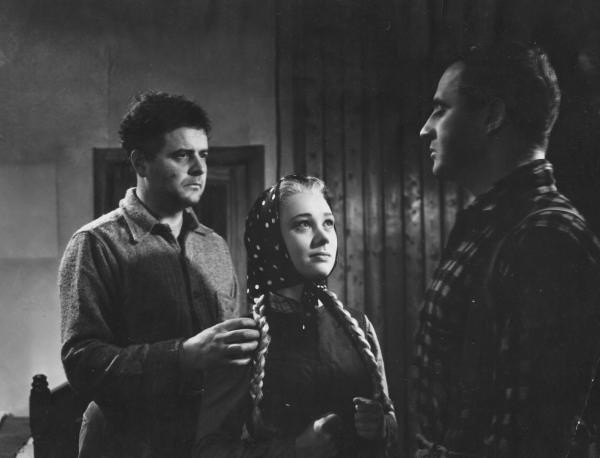 Glynis Johns in 49th Parallel (1941) held by Niall MacGinnis, showcasing her early role in a propaganda thriller.
Glynis Johns in 49th Parallel (1941) held by Niall MacGinnis, showcasing her early role in a propaganda thriller.
Initially uncast in Michael Powell and Emeric Pressburger’s 49th Parallel, a compelling propaganda thriller set in wartime Canada, Glynis Johns stepped into the role when Elisabeth Bergner departed the production. At just 17, Johns portrayed Anna, a compassionate teenager in a Hutterite settlement who encounters and shows empathy towards a reluctant Nazi, Vogel, played by Niall MacGinnis. Despite Bergner remaining in some long shots, Johns’ impactful performance as Anna earned her the National Board of Review’s Best Actress award, marking an early critical recognition of her talent in one of her early Glynis Johns movies.
The Halfway House (1944)
Director: Basil Dearden
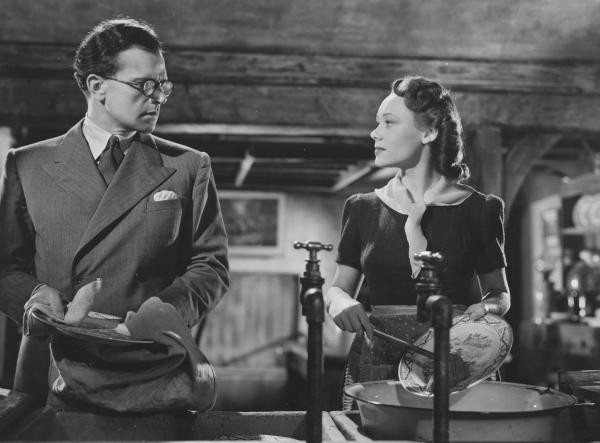 Glynis Johns and Esmond Knight in The Halfway House (1944), a poignant film featuring Glynis Johns alongside her father, Mervyn Johns.
Glynis Johns and Esmond Knight in The Halfway House (1944), a poignant film featuring Glynis Johns alongside her father, Mervyn Johns.
The Halfway House holds special significance in Glynis Johns movies as it marked the first on-screen collaboration between Glynis and her father, Mervyn Johns. Directed by Basil Dearden, this poignant film, adapted from Denis Ogden’s play The Peaceful Inn, subtly incorporated the backdrop of Luftwaffe bombings near a Welsh village. Johns plays Gwyneth, the softly spoken daughter, who, alongside her father, provides a comforting presence to the diverse guests at the inn. Her character offers solace to a young girl troubled by her parents and to a terminally ill conductor, played by Esmond Knight, showcasing Johns’ ability to bring warmth and depth to her roles even in ensemble casts.
Miranda (1948)
Director: Ken Annakin
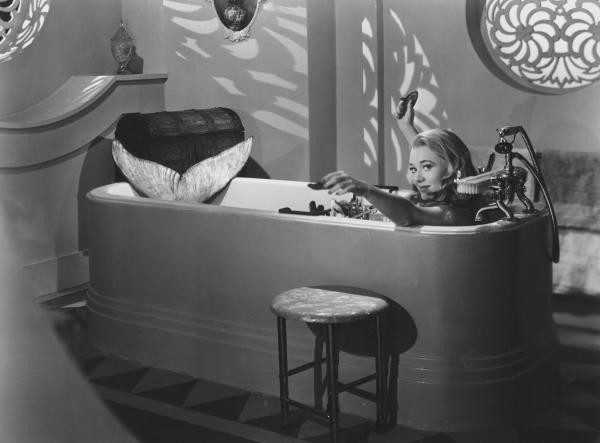 Glynis Johns as Miranda in Miranda (1948) bathing, embodying the playful and capricious mermaid character.
Glynis Johns as Miranda in Miranda (1948) bathing, embodying the playful and capricious mermaid character.
Miranda was the first of four collaborations between Glynis Johns and director Ken Annakin, and it remains one of her most beloved roles. Inspired by Peter Blackmore’s play, Johns embodies Miranda Trewella, a mischievous Cornish mermaid. With effortless charm and a tail crafted by Dunlop, she playfully manipulates Dr. Paul Martin (Griffith Jones) into taking her to London, disguised as a patient in a wheelchair. Johns’ portrayal of Miranda is both coquettish and amusing, as she captivates a manservant and an artist, all under the watchful eye of the enchanted Nurse Carey (Margaret Rutherford). Her reactions to everyday human occurrences and her comical fishing escapades at the zoo made Miranda an instant classic among Glynis Johns movies, leading to her reprising the role in Helter Skelter (1949) and Mad About Men (1954).
The Weak and the Wicked (1954)
Director: J. Lee Thompson
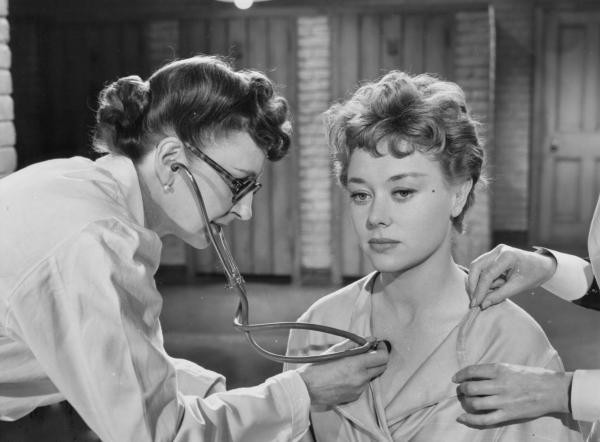 Glynis Johns in The Weak and the Wicked (1954), portraying Jean Raymond, a woman caught in the complexities of the prison system.
Glynis Johns in The Weak and the Wicked (1954), portraying Jean Raymond, a woman caught in the complexities of the prison system.
In The Weak and the Wicked, Glynis Johns takes on the role of Jean Raymond, a woman imprisoned, not as a hardened criminal, but as a victim of her own mistakes. This drama, inspired by Joan Henry’s autobiographical bestseller Who Lie in Gaol, delves into the harsh realities of prison life. While author Joan Henry initially considered Johns too “goody-goody” for the role compared to her co-star Diana Dors, Johns portrays Jean as an upper-class woman forced to confront the grim realities of Blackdown prison. This role, nestled between her empathetic widow in Frieda (1947) and femme fatale in Third Time Lucky (1949), showcases the range of Glynis Johns movies and her capacity to portray complex characters in varying shades of morality.
The Court Jester (1955)
Directors: Melvin Frank and Norman Panama
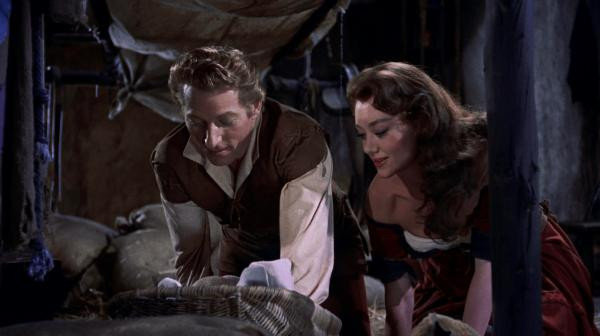 Danny Kaye and Glynis Johns in The Court Jester (1955), showcasing their comedic and action-packed partnership in a classic Hollywood film.
Danny Kaye and Glynis Johns in The Court Jester (1955), showcasing their comedic and action-packed partnership in a classic Hollywood film.
The Court Jester stands out in Glynis Johns movies as a showcase of her action and comedic talents. As Maid Jean, a spirited captain in the Black Fox’s rebel band, Johns wields a sword with impressive skill, fighting to overthrow the usurper King Roderick. Her accomplice is Hubert Hawkins (Danny Kaye), a minstrel who masquerades as an assassinative jester. Johns not only holds her own in daredevil combat and seductive schemes but also shines in comedic sequences, including the famous tongue-twisting “vessel with the pestle” routine. Her dynamic performance alongside Danny Kaye demonstrates her ability to not just keep pace with scene-stealing co-stars but to nearly outshine them.
The Spider’s Web (1960)
Director: Godfrey Grayson
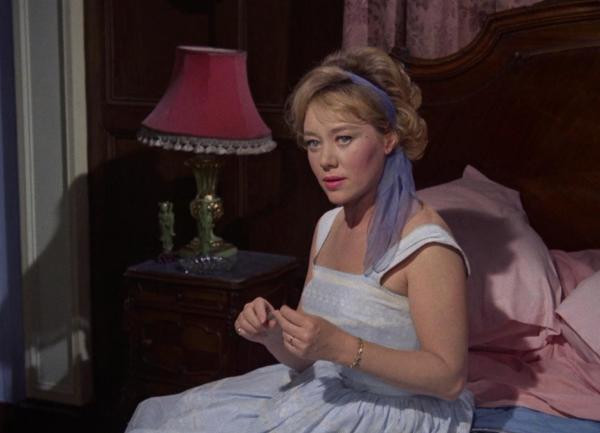 Glynis Johns in The Spider's Web (1960), portraying Clarissa Hailsham-Brown in Agatha Christie's country house mystery turned farce.
Glynis Johns in The Spider's Web (1960), portraying Clarissa Hailsham-Brown in Agatha Christie's country house mystery turned farce.
Adapted from Agatha Christie’s play, The Spider’s Web presents Glynis Johns as Clarissa Hailsham-Brown, the imaginative second wife of a diplomat who finds herself entangled in a country house murder mystery that often leans into farce. Clarissa believes her stepdaughter might have accidentally killed her odious new husband with a voodoo spell, leading to a series of comical attempts to conceal the body. Johns portrays Clarissa with a delightful blend of scatter-brained charm and resourcefulness, as she enlists the help of her guardian and gardener, played by Jack Hulbert and Cicely Courtneidge, adding another layer of comedic brilliance to Glynis Johns movies.
The Sundowners (1960)
Director: Fred Zinnemann
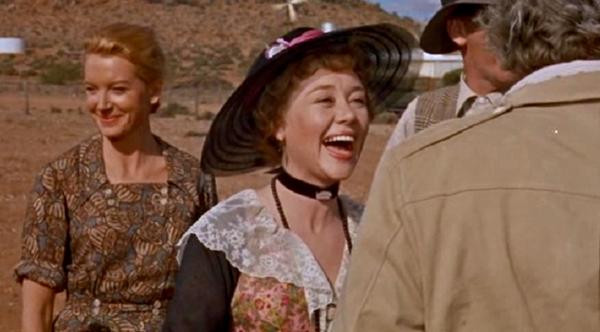 Glynis Johns and Deborah Kerr in The Sundowners (1960), a film that earned Glynis Johns an Oscar nomination for Best Supporting Actress.
Glynis Johns and Deborah Kerr in The Sundowners (1960), a film that earned Glynis Johns an Oscar nomination for Best Supporting Actress.
The Sundowners is arguably one of the most critically acclaimed Glynis Johns movies, earning her an Academy Award nomination for Best Supporting Actress. In Fred Zinnemann’s adaptation of Jon Cleary’s novel set in 1920s Australian outback, Johns plays Mrs. Firth, the independent and spirited publican of Cawndilla. While the film primarily focuses on the marital tensions between sheep drover Paddy Carmody (Robert Mitchum) and his wife Ida (Deborah Kerr), Johns shines as Mrs. Firth. She embodies a unique blend of outback grit and refined emancipation, owning a car, enjoying a drink with customers, and engaging in a romantic liaison with an English wool roller, played by Peter Ustinov. Interestingly, Mervyn Johns, her father, also appears in the film as the town mayor, adding another familial connection to this significant movie in her career.
The Cabinet of Caligari (1962)
Director: Roger Kay
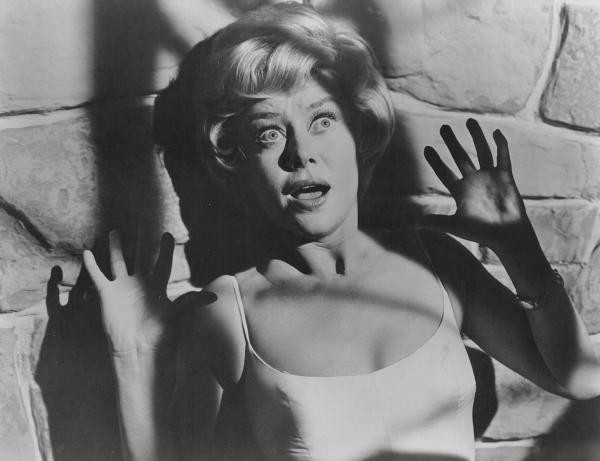 Glynis Johns in The Cabinet of Caligari (1962), a psychological thriller and a remake of the German expressionist classic.
Glynis Johns in The Cabinet of Caligari (1962), a psychological thriller and a remake of the German expressionist classic.
The Cabinet of Caligari offers a different facet of Glynis Johns movies, showcasing her in a psychological thriller. This 1962 remake of the German expressionist masterpiece casts Johns as Jane Lindstrom, a stranded tourist who becomes an unwilling guest of the enigmatic Dr. Caligari (Dan O’Herlihy). Scripted by Robert Bloch, known for Psycho, the film shares thematic and stylistic similarities with Hitchcock’s classic. As Jane becomes increasingly distressed, Johns compellingly portrays her struggle to escape and unravel the nightmare she’s trapped in, culminating in a twist ending. While not a classic on par with the original, Johns’ performance is a standout element.
Mary Poppins (1964)
Director: Robert Stevenson
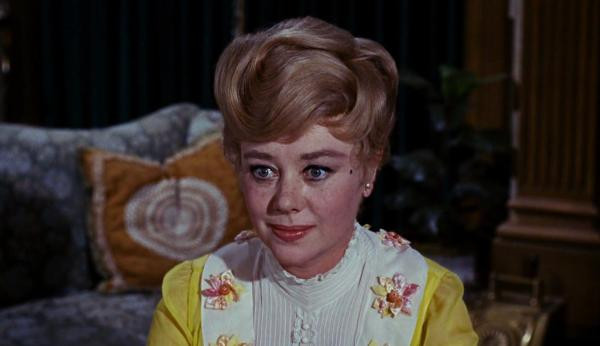 Glynis Johns in Mary Poppins (1964) as Winifred Banks, the suffragette mother in the beloved Disney classic.
Glynis Johns in Mary Poppins (1964) as Winifred Banks, the suffragette mother in the beloved Disney classic.
Despite her roles in Disney period films like The Sword and the Rose and Rob Roy, the Highland Rogue, Glynis Johns was often associated with modern, independent women. Mary Poppins, however, allowed her to blend this persona within an Edwardian setting. As Winifred Banks, the wife of a banker and mother of two, Johns portrays a woman deeply involved in Emmeline Pankhurst’s ‘Votes for Women’ campaign. She opens the movie with the iconic song ‘Sister Suffragette’, written specifically for her by the Sherman brothers. While her character provides moments of amusement, clutching valuables amidst Admiral Boom’s cannon fire, Winifred Banks ultimately remains in the background, never directly interacting with Mary Poppins (Julie Andrews). Nevertheless, her role is a memorable part of this beloved classic amongst Glynis Johns movies.
The Ref (1994)
Director: Ted Demme
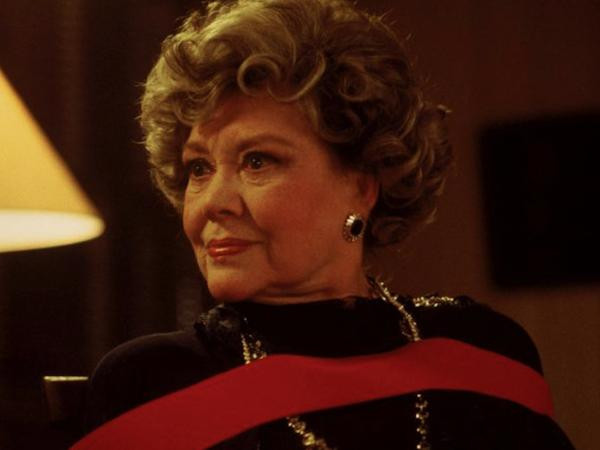 Glynis Johns in The Ref (1994) as Rose Chasseur, the manipulative matriarch in a dark comedy set during Christmas.
Glynis Johns in The Ref (1994) as Rose Chasseur, the manipulative matriarch in a dark comedy set during Christmas.
In The Ref, Glynis Johns takes on the role of Rose Chasseur, a grandmother who arrives for a chaotic Christmas dinner in this dark comedy. Rose is a manipulative matriarch who adds to the already tense hostage situation involving her son Lloyd (Kevin Spacey), his wife Caroline (Judy Davis), and a fleeing cat burglar (Denis Leary). Rose, wearing a St. Lucia crown of flaming candles, delivers impeccably timed venom and suspicion, believing the burglar is not a marriage counselor as claimed. This role, along with her grandmother portrayals in While You Were Sleeping and Superstar, demonstrates Johns’ willingness to embrace character roles later in her career, subverting her earlier “sweet” image in Glynis Johns movies with a delightfully sharp edge.
Glynis Johns’ contribution to cinema spans decades and genres, leaving behind a legacy of memorable performances. From her early roles in British cinema to her Hollywood successes and stage triumphs, she has consistently captivated audiences with her unique charm and talent. As we celebrate her 100th birthday, it’s the perfect time to revisit and appreciate the remarkable Glynis Johns movies that have enriched the world of film.

